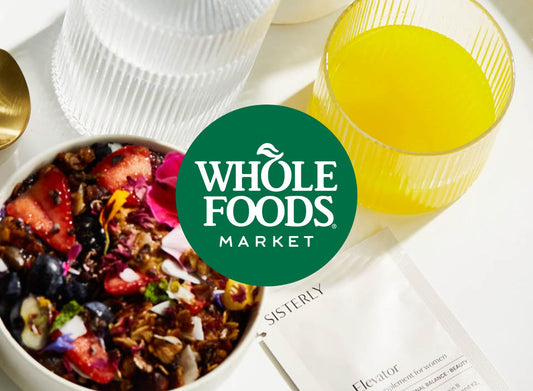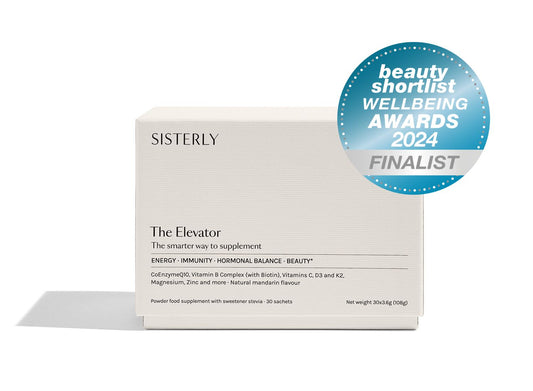Smart women take zinc!
SISTERLY’s female health experts formulated The Elevator with plenty of zinc. As one of the busiest minerals in the body, zinc contributes to bone density, supports the immune system, balances female hormones and backs up the brain when we need to think clearly. In this blog, food scientist and nutritional therapist Susie Perry explains why this multi-tasking mineral is important for hormonal balance and to balance blood sugar levels.
Zinc and blood sugar balance
Ever wondered why women sometimes seem to struggle more with cravings for carbs, sugary foods and alcohol than men? There’s a complex relationship between oestrogen, testosterone and insulin which is often at the core of many female health conditions, especially true for PMS (Premenstrual Syndrome) and PCOS (Polycystic Ovarian Syndrome).
Oestrogen helps insulin work effectively, so when oestrogen is low, typically in the 1-2 weeks leading up to your period (and during menopause), insulin becomes less effective – this situation is known as insulin resistance. Your body responds to this by signalling for more sugar to be consumed. Hello chocolate cravings!
Women with PCOS tend to have low oestrogen, high testosterone and insulin resistance, which is why women with PCOS often reach for refined carbs, sugar foods and caffeine. Zinc has been shown to improve insulin sensitivity contributing to better blood sugar control. By addressing insulin resistance, your cravings begin to curb and hormones start to rebalance.
How does zinc benefit hormone balance?
When it comes to women’s health, understanding the intricate balance of hormones is paramount to promoting optimal wellbeing and zinc plays a pivotal role in maintaining this delicate equilibrium. How does zinc achieve hormone balance? Well, zinc exerts its influence on your hypothalamus-pituitary-gonadal (HPG) axis, a complex system that enables your brain to communicate with your ovaries instructing the production of testosterone, oestrogen and progesterone.
Due to its involvement in hormone balance, zinc has been shown to be helpful for PCOS, endometriosis, PMS, fibroids, and menopause by acting as a cofactor for the enzymes involved in the synthesis, metabolism, and action of your female hormones.
Does zinc help balance female hormones?
When it comes to hormone production its enzymes that do all the heavy lifting and the enzymes responsible for producing oestrogen, progesterone, testosterone and SHBG, need zinc to work effectively. If you haven’t heard of SHBG before, it’s the name of a protein called sex hormone-binding globulin which acts as a shuttle bus, transporting your hormones to their most popular destinations.
By supporting the activity of these enzymes, zinc helps maintain an optimal hormone balance, important for your monthly cycle and particularly relevant for PCOS, where an imbalance in testosterone and oestrogen levels trigger irregular periods and acne.
Zinc and endometriosis
Zinc is also important for endometriosis which involves excessive thickening of the womb lining (endometrial tissue) causing extremely painful periods and heavy bleeding. It’s typically oestrogen dominance that drives this condition forward, this means your oestrogen has become far more effective than your progesterone.
Hormones need to dock into receptor sites to exert an effect and zinc plays a key role in promoting the proper functioning of progesterone receptors. This is helpful for women suffering from endometriosis, where progesterone resistance is common. By supporting progesterone, zinc helps ease up endometriosis related pain, bleeding and inflammation. Zinc is also important for the production of anti-inflammatory prostaglandins. These are tiny hormone-like molecules that dampen down inflammation, an impactful symptom of endometriosis.
How does zinc help perimenopause?
As women come to the end of their reproductive years the hormones which regulate monthly periods called FSH and LH become a little erratic, along with your mood and energy levels! Zinc is needed to keep these two hormones in line facilitating a smoother perimenopause.
Is zinc good for you in menopause?
If you hit menopause and lost your libido, then say YES to zinc! Zinc acts as a natural aromatase inhibitor, meaning it helps prevent your testosterone (needed for your sex drive) being converted into oestrogen. Studies show the benefits of zinc for post-menopausal women include improved testosterone levels and increased sexual function.
The Elevator for SISTERLY contains 5mg of zinc giving you 50% of the recommended daily allowance. There are different forms of zinc found in supplements, some forms (oxide, carbonate, sulphate) might be cheaper but are poorly absorbed so your body doesn’t gain the full benefits. The Elevator contains highly absorbable zinc citrate, because SISTERLY doesn’t cut corners when including the best forms of nutrients in The Elevator.
What are the best food sources of zinc?
The other 50% of your daily intake is easy to obtain from your daily diet and foods with the highest levels of zinc include oysters, grass-fed beef, lamb, free range turkey, fish, shellfish and for vegetarians - cashews, pumpkin seeds, sunflower seeds, hemp seeds, lentils and eggs. Snacking on nuts and seeds instead of crisps and biscuits is a smart SISTERLY wellness switch to boost your intake of zinc.




